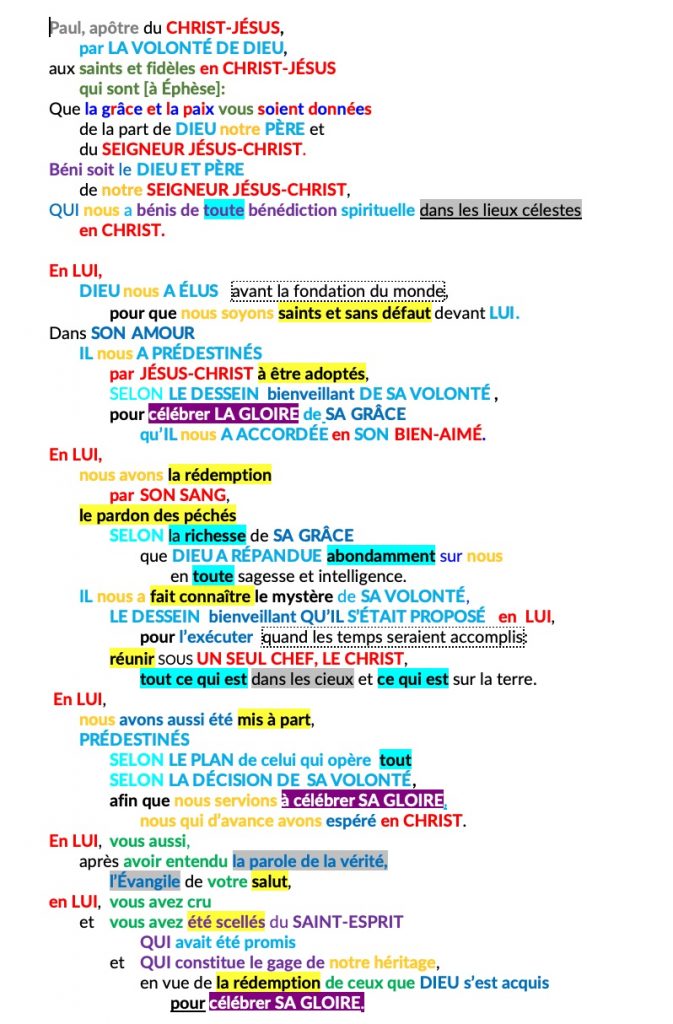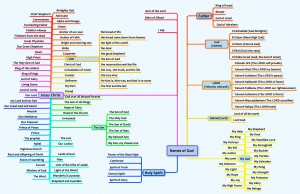Les Psaumes imprécatoires
Introduction :
Parmi les 150 Psaumes dans la Bible, seulement trois pourraient être classifiés comme totalement imprécatoires : 35, 69, 109 (Kaiser). Il y en a aussi 15 autres qui possèdent quelques versets imprécatoires.
Voici un sommaire rédigé par Alfred Kuen sur le problème des Psaumes imprécatoires :
« Les psaumes dits imprécatoires nous posent un problème épineux : comment pouvons-nous demander à Dieu la destruction de nos ennemis (Ps 35.8?; 55.16), qu’ils aient les dents cassées (Ps 58.7), les yeux aveuglés (Ps 69.24) et voient leurs enfants massacrés (Ps 137.9), alors que Jésus nous a appris à aimer nos ennemis, à bénir ceux qui nous maudissent, à faire du bien à ceux qui nous haïssent et à prier pour ceux qui nous maltraitent et nous persécutent (Matt 5.24)?? » (Kuen, 205)
D’autres questions à se poser :
– Est-ce qu’un chrétien aujourd’hui peut énoncer de telles prières??
– Est-ce qu’ils ont été écrits dans un esprit de vengeance??
Quelle est la définition d’imprécation ? C’est une invocation de jugement, de catastrophe ou une malédiction énoncée contre un ennemi qui est aussi au même moment un ennemi de Dieu. (Kaiser)
1. Les solutions inadéquates (Laney, 37-40).
(1) Ce sont les imprécations des ennemis de David.
Mais cela ne colle pas avec le contexte.
(2) Ce sont les sentiments de David, mais pas de Dieu.
On ne peut pas diviser certaines portions d’Écritures qui seraient inspirées et d’autres que ne le seraient pas. « C’est toi qui as dit par le Saint-Esprit, par la bouche de notre père, ton serviteur David : pourquoi ce tumulte parmi les nations, et ces vaines pensées parmi les peuples?? » (Actes 4.25).
(3) David vivait au temps de l’AT.
• Mais même l’AT est contre la haine et la vengeance :
« A moi la vengeance et la rétribution, quand leur pied chancellera?! Car le jour de leur malheur est proche, et ce qui les attend ne tardera pas. » (Deut. 32.35).
« Tu ne haïras point ton frère dans ton cœur?; tu auras soin de reprendre ton prochain, mais tu ne te chargeras point d’un péché à cause de lui. 18 Tu ne te vengeras point, et tu ne garderas point de rancune contre les enfants de ton peuple. Tu aimeras ton prochain comme toi-même. Je suis l’Éternel. » (Lév. 19.17-18).
Voir aussi Prov. 24.17-18 ; 25.21-22 (Rom. 12.20)
• Dans le NT, nous avons plus de lumière, mais cela ne dit pas que l’éthique de L’AT est différente de celle du NT.
(4) Ce sont des prières contre des antagonistes spirituels et pas contre des ennemis réels.
Cette interprétation est trop subjective. Comment décider quand il y a transition entre le littéral et le spirituel??
(5) Les imprécations sont prophétiques. Les psalmistes prédiraient ce qui va se passer avec les méchants. Cependant, ces prières ne semblent pas déclarer des choses qui se passeront dans l’avenir, mais les prières de quelqu’un pour que ces choses arrivent.
(6) Cela démontrerait l’humanité du Psalmiste qui ne se trouvait pas dans la volonté de Dieu.
Mais l’inspiration et l’inclusion des prières imprécatoires est dans nos Bibles…
2. Les buts des imprécations : (Laney, 41) (pour la Gloire de Dieu)
(1) Affermir les justes, les rendre plus solides et fermes.
« L’Éternel juge les peuples : Rends-moi justice, ô Éternel?! Selon mon droit et selon mon innocence?! 9 Mets un terme à la malice des méchants, Et affermis le juste, Toi qui sondes les cœurs et les reins, Dieu juste?! » (Ps 7.8-9)
(2) Pour louer l’Éternel après la délivrance et se réjouir de l’œuvre du Seigneur :
« Je louerai l’Éternel à cause de sa justice, Je chanterai le nom de l’Éternel, du Très-Haut. » (7:18)
« Je te louerai dans la grande assemblée, Je te célébrerai au milieu d’un peuple nombreux. » (35:18).
(3-4) Pour voir la récompense des justes et de reconnaître que Dieu est le juge de toute la terre, le roi qui est souverain au-dessus de toutes choses.
« Et les hommes diront : Oui, il est une récompense pour le juste?; Oui, il est un Dieu qui juge sur la terre. » (58:12)
« Détruis-les, dans ta fureur, détruis-les, et qu’ils ne soient plus?! Qu’ils sachent que Dieu règne sur Jacob, jusqu’aux extrémités de la terre?!— Pause. » (Ps 59:13-14).
(5) Pour que les méchants recherchent l’Éternel.
(83:17) « Couvre leur face d’ignominie, Afin qu’ils cherchent ton nom, ô Éternel?! »
(83:18) « Qu’ils soient confus et épouvantés pour toujours, Qu’ils soient honteux et qu’ils périssent?! »
(83:19) « Qu’ils sachent que toi seul, dont le nom est l’Éternel, Tu es le Très-Haut sur toute la terre?! »
« Ne te réjouis pas de la chute de ton ennemi, Et que ton cœur ne soit pas dans l’allégresse quand il chancelle, De peur que l’Éternel ne le voie, que cela ne lui déplaise, Et qu’il ne détourne de lui sa colère. » (Prov. 24.17-18)
3. La base pour les malédictions sur les ennemis d’Israël : (Laney, 41-42).
« L’Éternel dit à Abram : Va-t’en de ton pays, de ta patrie, et de la maison de ton père, dans le pays que je te montrerai. 2 Je ferai de toi une grande nation, et je te bénirai?; je rendrai ton nom grand, et tu seras une source de bénédiction. 3 Je bénirai ceux qui te béniront, et je maudirai ceux qui te maudiront?; et toutes les familles de la terre seront bénies en toi. » (Gen. 12.1-3)
David, en tant que représentant de la nation, a eu le droit de prier que Dieu puisse effectuer ce qu’Il a promis : maudire ceux qui maudissent Dieu.
Si nous voyons que l’alliance abrahamique était une réflexion d’une promesse de Dieu à Abraham et à ses descendants, il n’est pas approprié pour une personne de l’époque de l’Eglise de prier pour le jugement d’un méchant. Tout comme les lois cérémoniales et les lois culinaires n’ont pas d’application directe pour les croyants de notre âge, les psaumes imprécatoires n’en ont pas non plus.
(Rom 12.14) « Bénissez ceux qui vous persécutent, bénissez et ne maudissez pas. »
(Rom 12.19) « Ne vous vengez point vous-mêmes, bien-aimés, mais laissez agir la colère?; car il est écrit : à moi la vengeance, à moi la rétribution, dit le Seigneur. »
(2 Tim 4.14) « Alexandre, le forgeron, m’a fait beaucoup de mal. Le Seigneur lui rendra selon ses œuvres. »
4. L’attitude de celui que prie : (1-5 ; Laney, 42-43).
1) David n’a jamais prié pour avoir la permission de se venger de ses ennemis, mais plutôt pour que Dieu Lui-même le venge. C’était aussi son attitude envers Saul.
(7:7) « Lève-toi, ô Éternel?! Dans ta colère, lève-toi contre la fureur de mes adversaires, réveille-toi pour me secourir, ordonne un jugement?! »
(35.1) « De David. Éternel?! Défends-moi contre mes adversaires, Combats ceux qui me combattent?! »
(58:7) « O Dieu, brise-leur les dents dans la bouche?! Éternel, arrache les mâchoires des lionceaux?! »
(59:6) « Toi, Éternel, Dieu des armées, Dieu d’Israël, Lève-toi, pour châtier toutes les nations?! N’aie pitié d’aucun de ces méchants infidèles?!— Pause. »
2) Le droit de venger reste toujours à Dieu :
(Deut. 32.35) « À moi la vengeance et la rétribution, Quand leur pied chancellera?! Car le jour de leur malheur est proche, Et ce qui les attend ne tardera pas. »
(Ps. 94.1) « Dieu des vengeances, Éternel?! Dieu des vengeances, parais?! »
(Héb. 10.30) « Car nous connaissons celui qui a dit : À moi la vengeance, à moi la rétribution?! et encore : Le Seigneur jugera son peuple. »
“Les imprécations ne sont pas seulement des expressions de colère ; elles nous permettent de tourner notre colère vers Dieu pour qu’il agisse comme il l’entend. Ces prières ne demandent pas à Dieu les ressources et l’opportunité de se venger de nos ennemis ; elles lui demandent de le faire et lui reconnaissent la liberté d’agir ou de ne pas agir comme il l’entend. Ainsi, les imprécations sont conformes au conseil que Paul donne à ses lecteurs : “Ne rendez à personne le mal pour le mal. Recherchez ce qui est bien devant tous les hommes. 18 S’il est possible, autant que cela dépend de vous, soyez en paix avec tous les hommes. 19 Ne vous vengez point vous-mêmes, bien-aimés, mais laissez agir la colère; car il est écrit: A moi la vengeance, à moi la rétribution, dit le Seigneur” (Rom. 12:17–19; Firth, 2005).[1]
3) Il est important de distinguer entre les « justifications » et le fait « d’être vindicatif ». La passion du psalmiste était pour la justice et les psaumes imprécatoires n’ont pas leur source dans un désir d’être vindicatif personnellement, avec malice, dans une amertume qui recherche la vengeance. David était capable de montrer de la générosité, même sous le feu d’attaques dirigées personnellement contre lui.
« Et David dit à Abischaï et à tous ses serviteurs : Voici, mon fils, qui est sorti de mes entrailles, en veut à ma vie?; à plus forte raison ce Benjamite?! Laissez-le, et qu’il maudisse, car l’Éternel le lui a dit. » (2 Sam 16.11?; voir aussi 19.16-23).
David était concerné par la justification, la justice, un souci que nous trouvons aussi dans le NT (Luc 18.1-8).
« Toutes ces paroles sont des prières. Rien ne nous indique qu’elles furent accompagnées d’actes ou même de menaces contre les adversaires. David a formulé de telles prières (Ps 5.11?; 12.4-5?; 28.4), mais lorsqu’il tenait son ennemi à sa merci, il s’est contenté de lui couper un pan de son manteau (1 S. 24.1-23) ou de prendre sa lance et sa cruche d’eau (1 S. 26.12). Ayant remis sa cause entre les mains de Dieu, il recevait de lui la force d’agir sans haine et sans violence. » (Kuen, 206)
4) Le concept de David au sujet de la royauté nous donne beaucoup de lumière sur l’attitude de celui qui a énoncé les imprécations. Le roi était choisi par Dieu et était le représentant de Dieu sur la terre. David a montré un grand respect pour le roi oint avant lui et a refusé de lever sa main contre l’oint de Dieu (1 Sam. 24.10?; 26.11). Une attaque contre le roi était vue comme une attaque contre Dieu. Alors, de la même manière, David considérait les attaques lancées contre lui comme des attaques menées contre Dieu. Ainsi, il a prié pour la destruction des méchants, pas pour une vengeance personnelle, mais venant d’un zèle pour Dieu et son royaume.
5) Les imprécations nous montrent une aversion contre le péché et le mal. Les imprécations étaient dirigées vers ceux qui s’opposent à Dieu et à la cause de Dieu. C’est l’aversion contre le péché qui a poussé David à demander la justice de Dieu et son jugement contre les méchants (Ps. 139.23-24).
6) Le langage poétique, hyperbolique : les exagérations ne devraient pas être interprétées de manière littérale (Dray).
10:15 Brise le bras du méchant, punis ses iniquités, et qu’il disparaisse à tes yeux!
3:8 Lève-toi, Eternel! sauve-moi, mon Dieu!
Car tu frappes à la joue tous mes ennemis,
Tu brises les dents des méchants.
7) « Le psalmiste identifie ses intérêts avec ceux de Dieu. » (Kuen, 207)
Les Psalmistes ont écrit sous l’inspiration de Dieu, même en ce qui concerne la nature du mal. Ils étaient imprégnés du caractère et du nom de Dieu (9:16-20?; 83:16-17) et ils avaient un souci pour la manifestation de la justice et de la sainteté de Dieu sur la terre. Parce que le mal est mis en contraste avec la nature de Dieu et son plan, les Psalmistes ont prié pour la rétribution divine, grâce à laquelle l’ordre de Dieu sera rétabli (109:6-21) et le peuple de Dieu rassuré par son amour (109:21, 26).
- Un désir pour la repentance des ennemis et leur crainte de Dieu (Ps 83.14-18 ; 59.13 ; 76.8-10 ; 58.11 ; 64.1-4, 7-9)
- Que les justes puissent se réjouir et aient confiance dans le Seigneur (Ps 64.7-10 ; 58.10 ; 35.8-9, 26-28 ; 79.9, 12-13)
- Que le but de Dieu et son œuvre puissent être accomplis (Néhémie 4:6 ; vie de David comme l’oint de Dieu)
Lewis : Les Psaumes imprécatoires nous montrent qu’il y a des choses que Dieu regarde avec haine. - Ps. 7, 35?; 58?; 59?; 69?; 83?; 109?; 137?; cf. 3:7?; 5:10?; 6:10?; 7:14-16?; 9.19?; 10.2, 15?; 17.13?; 28:4-5?; 31:17-18?; 37:2, 9-10, 15, 20, 35-36?; 40:14-15?; 54:5?; 55:9, 15, 23?; 59:12-13?; 63:9-11?; 64:7-9?; 68.1-2?; 69?; 70.2-3?; 71:13?; 79:6, 12?; 94.1?; 97.7?; 104.35?; 129.5-6?; 139:19-22?; 140:9-10?; 141.10?; 143.12.
5. Les autres passages imprécatoires de la Bible
(Moise) « Quand l’arche partait, Moïse disait : Lève-toi, Éternel?! et que tes ennemis soient dispersés?! que ceux qui te haïssent fuient devant ta face?! » (Nomb. 10.35)
(Déborah) « Périssent ainsi tous tes ennemis, ô Éternel?! Ceux qui l’aiment sont comme le soleil, Quand il paraît dans sa force. Le pays fut en repos pendant quarante ans. » (Juges 5.31)
(Jérémie) « Tu sais tout, ô Éternel, souviens-toi de moi, ne m’oublie pas, Venge-moi de mes persécuteurs?! Ne m’enlève pas, tandis que tu te montres lent à la colère?! Sache que je supporte l’opprobre à cause de toi. » (Jér. 15.15, voir aussi 11:18s?; 17.18?; 18.21-23?; 20.12).
(Néhémie 4.4-5?; 6.14?; 13.29)
Beaucoup de Psaumes de lamentations contiennent une prière imprécatoire (3:7?; 5:10?; 6:10?; 7:14-16?; 28:4-5?; 31:17-18?; 37:2, 9-10, 15, 20, 35-36?; 40:14-15?; 54:5?; 55:9, 15, 23?; 59:12-13?; 63:9-11?; 64:7-9?; 71:13?; 79:6, 12?; 139:19-22?; 140:9-10). Ces Psaumes sont attribués à David (35?; 58?; 69?; 109), à Asaph (83) et à un inconnu (137). L’expression de la haine et le désir pour la justification ne se limitent pas aux Psaumes. On les trouve aussi dans les prières de Jérémie (11:18-20?; 15:15-18?; 17:18?; 18:19-23?; 20:11-12) et de Néhémie (6:14?; 13:29).
6. Quelle est la relation entre les imprécations de l’AT et les enseignements du NT ?
« Faut-il donc parler d’une moralité de l’Ancien Testament que l’on opposerait à celle du Nouveau Testament?? Il y a, certes, des différences d’accent, mais remarquons que nous trouvons dans le Nouveau Testament des prières et des passages semblables à ceux qui nous occupent dans les Psaumes (Luc 18.1-18?; Gal. 1.8?; Apoc. 6.10?; 18.20?; 19.1-6). D’autre part, l’Ancien Testament enseigne aussi que nous devons aimer notre prochain comme nous-mêmes (Lév. 19.17-18), rendre le bien pour le mal (Ps. 7.5?; 35.12-14) et refuser la violence que l’Eternel abhorre. Il y a progression dans la révélation, non de l’erreur vers la vérité, mais d’une révélation partielle vers une lumière totale. » (Kuen, 207)
L’amour, même pour nos ennemis : Lév. 19:17-18?; Prov. 25:21.
Le NT enseigne que les hommes doivent rendre compte à Dieu pour leurs œuvres et dans cet état, ils sont sur la colère de Dieu (Actes 17.30-31).
Le Seigneur Jésus a proclamé un jugement contre Corazin et Capernaum (Matt. 11:21-24?; Luc 10:13-15) et il a fortement réprimandé les chefs et l’incrédulité des Juifs (Matt. 7:23?; cf. Ps 6:8?; Marc 11:14?; 12:9). Les apôtres ont vu les hérétiques et les méchants comme livrés à la destruction (1 Cor 5:5?; 16:22?; Gal. 1:8-9?; 5:12?; 2 Tim. 4:14 [cf. Ps. 62:12]?; 2 Pie. 2?; 2 Jn 7-11?; Jude 3-16). Dans la parabole du juge inique, notre Seigneur a encouragé les croyants à avoir de la persévérance dans la prière en confirmant la conviction que Dieu est juste et qu’Il fera « justice à ses élus, qui crient à lui jour et nuit, et tardera-t-il à leur égard?? » (Luc 18.7).
Dans cet esprit, nous devons apprécier le cri des martyrs dans le ciel quand il prie pour la vindicte de Dieu et quand ils se réjouissent du jugement des méchants (Apoc 18:20?; 19:1-6). L’apôtre Paul a aussi encouragé les chrétiens opprimés à attendre avec impatience le retour de notre Seigneur comme le temps désigné pour la vindicte de Dieu à l’égard de son Eglise (2 Thess. 1:6-10?; cf. Ps. 79:6). Avec cette lumière, nous pouvons apprécier la perspective des Psaumes.
7. Les exemples d’imprécations :
« Fille de Babylone, la dévastée, Heureux qui te rend la pareille, Le mal que tu nous as fait?! Heureux qui saisit tes enfants, Et les écrase sur le roc?! » (Ps. 137.8-9)
1. La citation de Jésus :
« ils te détruiront, toi et tes enfants au milieu de toi, et ils ne laisseront pas en toi pierre sur pierre, parce que tu n’as pas connu le temps où tu as été visitée. » (Luc 19.44)
2. « Tes enfants » n’indique pas un âge, mais la relation que cette personne a avec ses parents. « Le mot ‘’enfants’’ (traduit par nourrissons) risque de nous induire sur une fausse piste. Le mot hébreu indique une filiation, non un âge. Il peut s’appliquer à des descendants de n’importe quel âge. Il montre simplement ici que les péchés des pères se répètent dans la génération suivante. » (Kaiser)
3. « les écrase sur le roc », une métaphore : dans la Babylonie, le terrain est plat, il n’y a pas de collines ou de falaises. Le même mot était utilisé dans le Ps. 141.6 :« Que leurs juges soient précipités le long des rochers, Et l’on écoutera mes paroles, car elles sont agréables. »
4. « Heureux » parce qu’il sera l’instrument utilisé par Dieu pour accomplir sa volonté.
5. “Les jugements ne sont que ce que Dieu lui-même décrète dans d’autres lieux. Un livre entier de la Bible a été écrit pour déclarer le jugement à venir sur Édom. Ce livre est Abdias, et la raison donnée pour le jugement est précisément ce à quoi fait allusion ce psaume, à savoir que lorsque Jérusalem est tombée, le peuple d’Édom n’a pas pleuré les souffrances de son frère, comme il aurait dû le faire, mais s’est plutôt réjoui de la destruction. Le prophète ajoute que les Édomites « se sont tenus à l’écart », « se sont réjouis », « se sont emparés de leurs richesses », et même « ont remis les survivants » lorsqu’ils les ont pris (Obadiah 11-14). D’autres jugements sur Édom peuvent être trouvés dans Ésaïe 34:5-15 ; 63:1-4 ; Jérémie 49:7-22 ; Lamentations 4:21-22 ; Ézéchiel 25:12-14 ; 35:1-15 ; 36:5 ; Joël 3:19 ; et Amos 1:11-12…..Il existe de nombreuses prophéties contre Babylone dans Ésaïe 13:1-14:23 ; 21:1-17 ; 47:1-15 ; et Jérémie 50:1-51:64. Le plus révélateur est le récit de la destruction de la Babylone des mystères dans Apocalypse 18 et 19.”[2]
6. Il est évident que les ennemis contre lesquels les psalmistes priaient avaient atteint le point de jugement, et les imprécations des écrivains coïncidaient avec le jugement de Dieu.[3]
Conclusion :
Ces versets expriment l’aspiration des croyants de l’AT à une justice que seul Dieu peut établir. Ce ne sont pas des déclarations de vendetta personnelle, mais l’expression d’un zèle pour l’établissement du royaume de Dieu et pour sa gloire. Ce ne sont pas des ennemis personnels qui ont provoqué cette prière ; le psalmiste voit dans leurs agissements des attaques dirigées contre Dieu et spécialement contre ses représentants dans la lignée du Messie. Ainsi, David et son ministère étaient au centre de ces attaques. (Kaiser dans Encyclopédie des difficultés)
- « Puis, s’étant mis à genoux, il s’écria d’une voix forte : Seigneur, ne leur impute pas ce péché?! Et, après ces paroles, il s’endormit. » (Actes 7.60)
- « Ne te réjouis pas de la chute de ton ennemi, Et que ton cœur ne soit pas dans l’allégresse quand il chancelle, De peur que l’Éternel ne le voie, que cela ne lui déplaise, Et qu’il ne détourne de lui sa colère. » (Prov. 24.17-18)
Bibliographie
Day, John N. The Imprecatory Psalms and Christian Ethics. BSac 159:634 (Apr 02).
Dray, Stephen. The Imprecatory Language of the Bible.
Gaebelein, Frank E., Ed., The Expositor’s Bible Commentary , Zondervan Publishing House,1990. Electronic text hypertexted and prepared by OakTree Software, Inc. Appendix à Ps 137 :Les Imprécations dans les Psaumes.
Kaiser, Walter. Toward Old Testament Ethics. Grand Rapids : Zondervan, (1981), 292-97.
Kuen, Alfred. Comment interpréter la Bible. Editions Emmaüs, (1991), 205-208.
Laney, J. Carl. Bibliotheca Sacra. A Fresh Look at the Imprecatory Psalms, Vol 138, Jan 1981, 35-44.
[1] Tremper Longman III, Psalms: An Introduction and Commentary, ed. David G. Firth, vol. 15–16, Tyndale Old Testament Commentaries (Nottingham, England: Inter-Varsity Press, 2014), 52.
[2] James Montgomery Boice, Psalms 107–150: An Expositional Commentary (Grand Rapids, MI: Baker Books, 2005), 1191–1192.
[3] Carl E. DeVries, “Imprecatory Psalms,” Baker Encyclopedia of the Bible (Grand Rapids, MI: Baker Book House, 1988), 1024.





